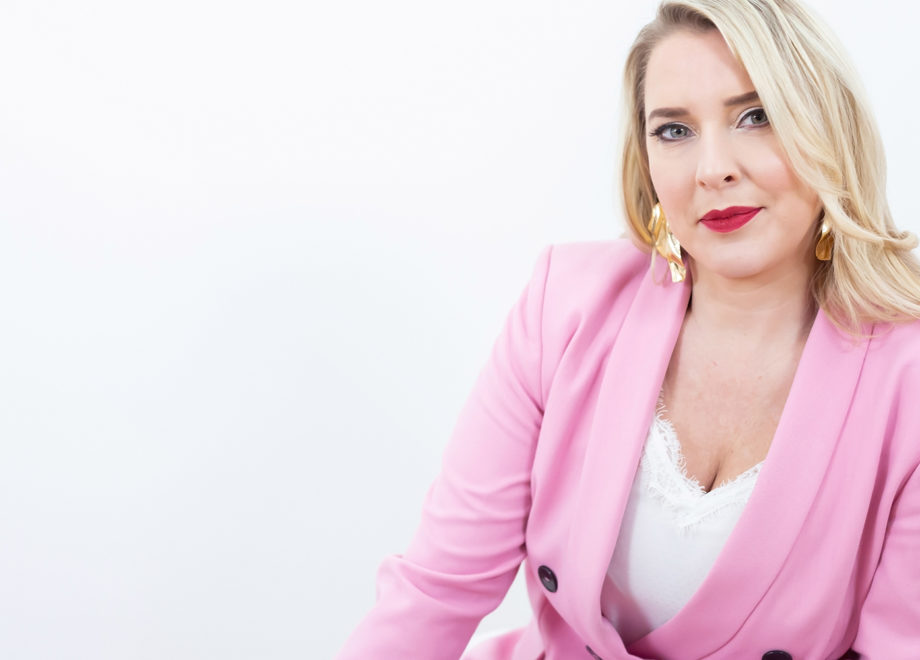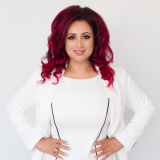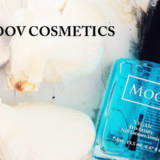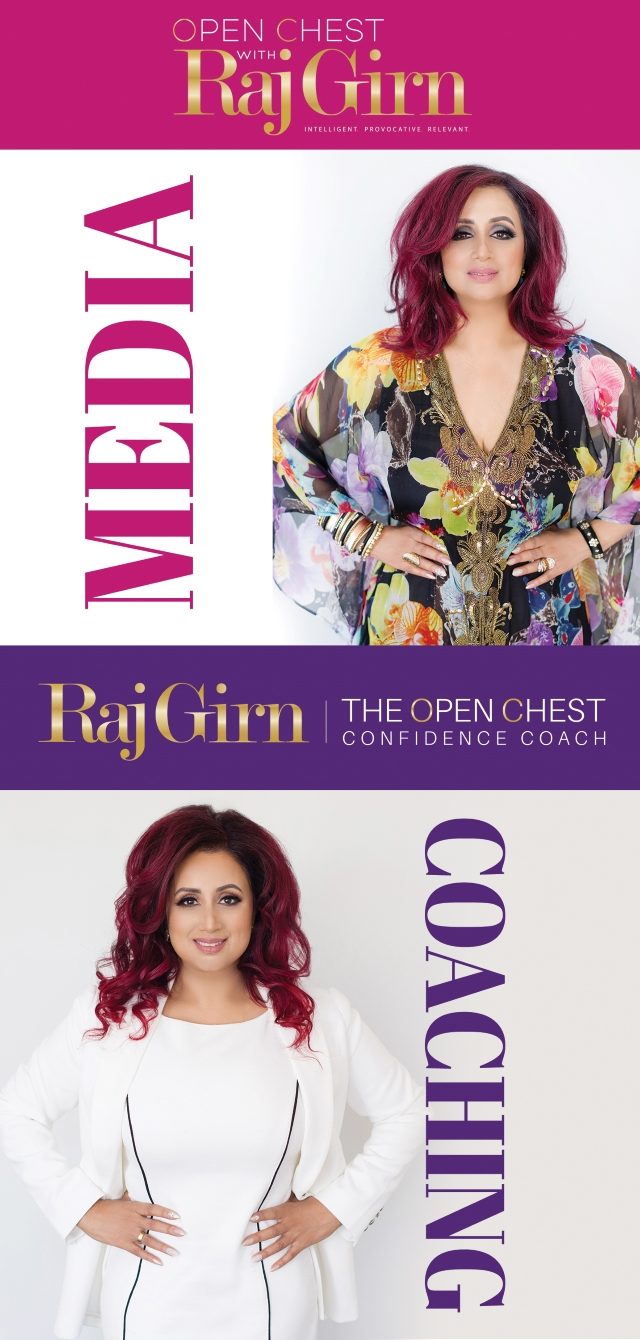In today’s stay-at-home online marketplace, more than ever before, we need expert advice to protect our rights and set us up properly when considering opening a business. To this end, Ashlee and I will be deep diving what do you need to know in terms of legal protection when starting a company and much more, so if you need to know any of this, then join us because this is your opportunity to find out.
LISTEN TO THE FULL INTERVIEW BELOW . . .
Welcome to another edition of Open Chest with Raj Girn Live, where I bring an insightful slew of guests who are personally people that inspired me and have inspired me along my journey of life. They inspire me because of the wonderful inroads that they are making in their respective professional careers. I speak with thought leaders, disruptors and well-known personalities, as well as everyday people like you and me, who are really looking to garner some insights into how we can better navigate the world that we live in, both on a personal and professional level because I feel everything that we garner, even from a professional arena, can really, really translate over well into our personal space as well.
Today’s guest is a woman I both admire and respect. She is the founder of Froese Law here in Toronto, which is a boutique cross-border branding business and intellectual property law firm. Her name is Ashlee Froese and she is recognized as a certified specialist in trademark law by the Law Society of Ontario, one of only six female lawyers in Ontario that carry that designation. Since 2017, Ashlee has been consistently recognized by the World Trademark Review as one of the top thousand trademark lawyers in the world. In 2019, Ashlee was only one of thirty-nine lawyers across Canada to be granted the Lexpert Zenith Award, which recognizes Ashlee as a change maker in law.
Ashlee’s scope of practice includes trademarks, copyright licensing, domain name, social media, marketing, advertising, packaging and labelling laws, corporate law and the negotiation and drafting of commercial agreements. And that’s all before breakfast. Ashlee is a guest speaker and published author on branding and fashion law across North America and is regularly asked to provide media commentary on key legal developments prior to launching Froese Law. Ashlee was a partner in a prominent Bay Street firm in Toronto. Please welcome my fabulous guest and super, super fabulous, awesome boss, babe Ashlee Froese.
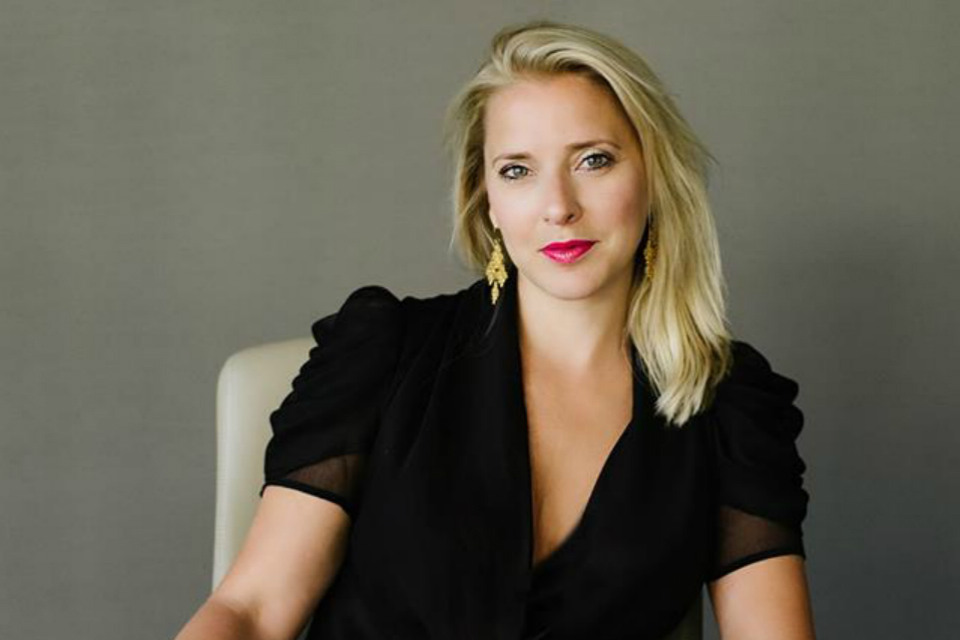
Yay!
HOW HER JOURNEY STARTED. . .
I know you always get a little bit shy and embarrassed around just kind of the profile that you’ve garnered. Well, you know, I want to get straight into it because I know that there’s just a wealth of information that we are going to be imparting in this hour with everyone. I feel that we need to kind of begin at the beginning of your journey to kind of contextualize why you decided to enter the law space. Can you share a little bit about your history that took you to where you decided that law was the profession that you wanted to be a part of. And I see you laughing already. I’m dying to hear this.
It’s totally not anything that’s inspiring. I wanted to fight for justice. All of this stuff. No, it was, do you remember L.A. Law?
Yes.
Do you remember Arnie Becker? I was like ‘Oh he’s hot, he’s sexy”. Ever since I was eight years old, I thought that was the shit like that was like the thing to do. And so, I always wanted to be a lawyer and I used to be extraordinarily shy. And, you know, I was in the British school system, which, you know, it’s very tough and all of that stuff. And I think it was just the sort of shock to the system of like, all right, well, I’m going to do the best that I can to sort of show you in a way. And I remember I was like eight years old. My mom was putting me to bed and she’s like, do you see your life when you’re older? I said, I’m going to be a boss, babe. I’m going to be working in the big city, working in a tower, high heels, short skirt. I don’t know why. And driving a BMW.
So, I had this very sort of a very clear linear division that I didn’t want to be dependent on a man. I wanted to live a certain lifestyle. I wanted to have not power, but I wanted to be something that people would take note of, and so I was fortunate from like eight years old that okay I want to be a ballerina anymore. Law is my go. And it guided everything. Even when I was 16, I moved to Canada. My mom made me work at McDonald’s to acclimatize me to North American culture.
I’m going to stop you for a second. For those of you who don’t know, Ashlee was actually brought up in England. And this is where you’re hearing kind of a bit of a British accent intertwined with her fabulous Canadian accent as well. So please continue.
Sorry, I’m worried about that, because people are going to be like, oh, god, which one are you? So, yeah, I mean, even when I was working at McDonalds at 16, I was like, is this going to help me get into law school or should I upgrade that? So, I had a very clear sort of linear path, which was helpful because I have nieces and nephews that are 19, 20. They don’t know what they want to do yet, which I totally understand. And so, I went to U of T because it’s as British as I could get in Canada and it was the best. Then from that I got a degree in international politics, worked at the UN for a little bit. In the Middle East it was very cool. Then went to law school. Osgoode, which is top tier.
Then I went to Bay Street and did that for ten years. Fast track to partner in six years which is pretty quick. Especially for women. It’s a very male dominated traditional old guard kind of industry and was there for ten years. And then I just sort of thought, I think I can do this in a different way that doesn’t compromise the Bay Street calibre but doesn’t buy into the rigidity, the ivory tower construct of traditional law. And here we are. We’re three years into having my own firm. We already received an award for being change makers in law. We’re up to five professionals and they’re all good people. And, you know, we’re making changes, conscious changes to advance how law is practiced in Canada. Hopefully that’s my intention.
HER EXPERIENCE BEING A WOMAN IN A MALE DOMINATED INDUSTRY. . .
That’s a lot of information to kind of, you know, digest. I want to kind of break some of that down before we move forward, Ashlee. You mentioned how as a woman, it’s in a male dominated environment that law still is, unfortunately. And Bay Street is even from its kind of whole ecosystem perspective outside of law as well. Talk to me a little bit about what that was like entering from the academic space into kind of this throwing yourself in the deep end kind of environment as a woman. You know, like what was some of the things that you can touch upon that stand out?
Yeah, I mean, as a woman, that also looks like I look like a blonde bimbo. I am not one. But you could easily discount me as that to your own detriment. Go ahead. It was interesting because I found that before the Me Too movement happened about two years ago, the mentality was it happens like it is what it is or boys will be boys or that’s just the male dominated world. And so, it wasn’t an acceptance of it, but it was a trickle off. So, when I was an articling student. So, you do law school, you write your licensing exam, and then it’s kind of like residency for doctors. Paid ten month sort of work, period, for training. I was told by a female lawyer who was the partner overseeing me to cut my hair, dye it brown and not wear high heels to be taken seriously.
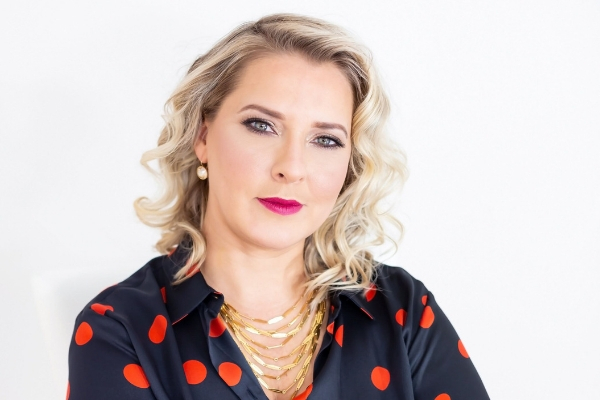
No way. You were told that by a woman? That’s interesting.
Who was also the woman who broke down barriers for sure, like she would be very proud to say she took a 24 hour mat leave and she used to have a sleeping bag in her office. Much respect because she broke down barriers, but I found also that this senior generation women, they propagated that kind of mentality where we don’t need to live like that now, because of you thank you but don’t continue that, that needs to stop. So that’s why for me, I’ve been very purposeful of mentoring the younger generation, because I didn’t find that that happened to me.
I found that it was the old boys club and then the older generation women that were playing in the old boys club that have been conditioned to that. I mean, that was one thing that I thought was bizarre. I’m like, well, this isn’t the firm for me. I think I’m going to move on. And then there’s, you know, when skinny jeans first started to become a thing. I was working at a firm and I was wearing skinny jeans and a blazer and a turtleneck like, you know, appropriate for Bay Street casual Fridays. And a managing partner came into my office, threw everything off my desk and said, I bet you can’t pick it all up. And I’m like that’s just bizarre.
So, what did you do? I’d love to know what you actually did in that situation, because I know you personally, but people out there don’t. So, what would you say to somebody who would face that now, that perhaps is something that you may have done back then?
Back then, I didn’t have the voice that I have now and be the context is different. So, I was kind of like, haha okay I’ll pick it up. And I was like, that’s on you, buddy. That’s water off my back. This is your issue, not mine. But I didn’t do [snaps fingers sassily] this because that wasn’t the environment back then, and also I was junior in my career, you know. And I know the guy. I had a good relationship with him, but he just made a really bad judgment call that now he wouldn’t do that.
But it was a more collegial type of environment that he took too far now, another time I was at a lunch drinks kind of thing with one of the rainmakers, and I was a partner at the time and he was one of those guys that he would go out and have the big steak dinners and whiskey drinks and the brandy drinks and but he would bring in a lot of business. So, he’s like, come with us. So, I would have white wine spritzer because I can’t keep up with that. The client of this rainmaking partner gave me his business card. It dropped through my hand and he turned to me, Raj Girn, and said, why don’t you bend over and pick that up for me?
Oh, my God. That’s like the second time.
Yeah, these are just little instances. So, these micro aggressions happened frequently. And that one I was a partner this time. I was like, no how about you bend over and you pick that up and you never talk to me like that again? So, it’s tough. And it’s interesting if you read the stats on law, attrition of women in law is a significant issue. Even when I was at my five-year reunion quite some time ago, which is very aging, at Osgoode, even at that point, fifty percent of the females from the class had dropped out of law. Bear in mind like I funded myself, I came out of law school with seventy-five-thousand-dollar debt like it’s very expensive to do it. And a lot of these women, they went into headhunting, they went into admin for law schools, they went into journalism, which are all fantastic. But you don’t necessarily need a law degree for that. And it was a shame to see.
Why do you feel that? What was it attributed to? Was it this whole kind of environment that they had to fight their way into? Or do you feel that there just wasn’t a welcoming space for our gender?
I think that in the end, when you’re dealing with traditional law, the hour is broken into units of ten. So, it means that every six minutes. So, one unit of an hour is six minutes, literally every six minutes of your day has to be accounted for and billed to a client. So, time is money. So us doing this right now in the old world. This is a lost opportunity cost of me charging my time. The law firms will say you have to hit a target of eighteen hundred hours a year of billing time. That’s not the sort of networking, the speaking engagements, the business development, your vacations.
So, when you’re literally every six minutes like going to the bathroom is taking up your time. I think it’s hard if you’re having children. I think that it’s a very archaic business model which doesn’t serve the interests of the clients, by the way, I just think it’s very tough and it’s traditional. Like law is generally an industry that there’s preceding cases and that dictates how things go. So that’s a sort of mentality of the industry as a whole. Big changes don’t happen all that much. You want to change legislation. It’s got to go through government to sort of take three, four years to do. And you really want to change case law. You’ve got to take it from basic court to appeals court to Supreme Court. That’s five, six years. Well, I think it’s a bit of a mentality thing.
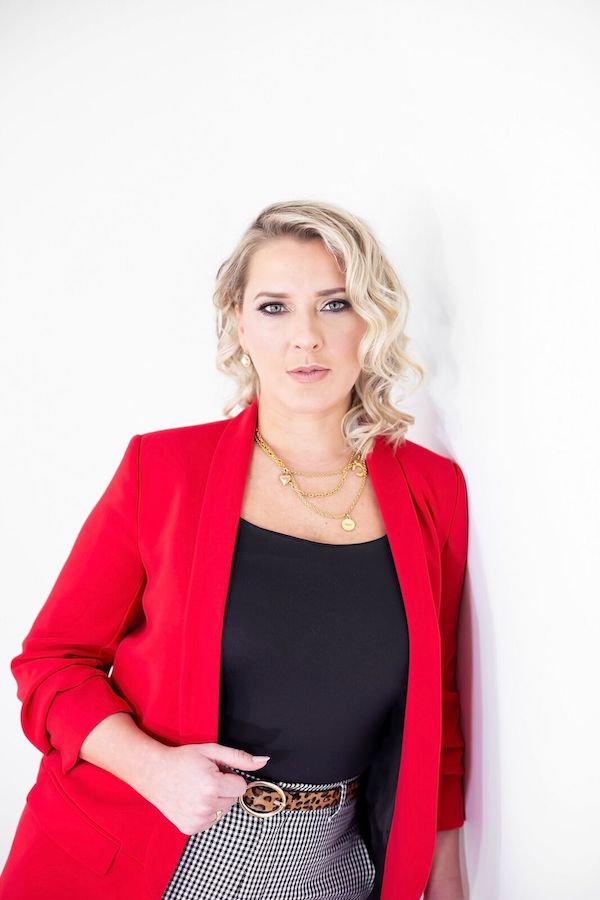
HOW HER LAW FIRM FROESE LAW IS DIFFERENT. . .
So let’s talk about that a little bit, because it was that mentality that encouraged you to say I’m done with Bay Street, like I’ve paid my dues, I’ve learnt and honed my breadth of the skills and knowledge, and now it’s time for me to take all of that and put it into an environment of law that, of course, is conforming to what is expected as a lawyer, but also is making it a lot more easier for entrepreneurs and clients to be able to hire lawyers. Oftentimes we get ourselves in trouble as entrepreneurs because we’re too scared of the bill that’s going to come with even having a five minute conversation with the lawyer. And you just kind of finished substantiating why that is. You kind of put that on its head and you decided to do something a little different when you started Froese Law. Let’s talk a little bit about how Froese law is different, perhaps than a lot of the traditional engines out there.
Yeah. So, I want to be clear that I don’t denigrate the whole Bay Street experience. Law school teaches you nothing about being a lawyer. Law school teaches you about the academics of law, which we all know academics and practical business are very separate. I am very grateful for having honed my skills on Bay Street and perfecting it. So, the people that are just launching their firm straight out of law school, they’re missing a big part of the tutelage, I think, and skill development. I’m very appreciative for it. So I don’t want to get that twisted. When we started my firm, we did it in a bit of a different way in that we focus on certain industries. So, there will be firms that are employment law firms or our intellectual property law firms or our full-service firms where you can do everything.
We focus on B2C business to consumer branded products, services and talent. So if you’re an influencer, celebrity, magazine, fashion apparel, cosmetics, cannabis, events company, if you are shifting pop culture and you’re a lifestyle type of product or service or celebrity kind of model agent, whatever it is, this is your home because we have that industry focus. We can see the trajectory of your business and the nuances of it, sometimes even faster than the business owners can. That is something that I found has been a great value add because there’s few firms that actually really focus on being that industry kind of focus. So that’s the one thing that has put us as a point of differentiation. The second thing is we’ve grown to five people. They’ve all come from Bay Street. Our lawyers don’t have less than 10 years’ experience. So, you’re getting that level of sophistication, but not that huge markup price. We charge a flat fee.
So, a lot of the things that we do are actually, okay, this is the work that’s going to be done. This is what the budget is going to be for it. And these are what you can do. So instead of that, like, oh, it’s an ongoing every six minutes. No, you have an agreement. You have a deal. This is how much it is. And you factor that into your budgeting. Now, as a business owner, I get it. I’m not just a lawyer. I’m a business owner. And then, you know, I do think that we have to look at what is our place in the world. So, we’re paperless. Our business cards are made from recycled clothing fabric. Law firms are notorious for just paper, paper, paper, paper. So, we’re trying to be environmentally conscious. And then to be honest with you, the law is a very whitewashed industry. It’s very white male. So in hiring, I wanted to create a firm that celebrates diversity and is a home for those that are excelling. Out of the five of us, our workforce represents Persian community, South Asian community and also African community.
WHAT ENTREPRENEURS NEED TO KNOW FROM A LEGAL PERSPECTIVE. . .
That is incredible. You’ve really, really thought about the reality of the world we live in today and your firm is not only representing that but is also providing services to help people understand the world of business that we live in today. So, let’s talk a little bit about that. Ashlee, let’s talk a little bit about the someone who’s starting a company. What do entrepreneurs need to know from a legal perspective? Just off the top.
The foundation that you need to know is that the law is going to be relevant to you whether you pay attention to it or not. One of the things in the ethos of our firm is very much volunteerism and knowledge is power. We want to be an ally for a client’s success. We issue out newsletters every week on updates in the law and not the sort of heretofore ipso facto that kind of lawyer speak. But like, okay, you’re starting a business. There’s three options that you want to go with sole proprietor partnership or incorporation, which one do you choose. Why? okay, you’ve done that. Now you want to look at a disclosure. What’s the difference between non-disclosure and independent contractor agreement? We have an article and you can read up on it.
So, we try to educate our clients to be an ally for success rather than that hierarchical, top down ivory tower construct because you don’t know what you don’t know. And this is helping our clients to educate them, we’re not going to be able to do all of their contracts. But at least they have enough information to be like, maybe I should talk to someone. Maybe I should address that. So, you know, there’s one article that we do. It’s when you’re turning your side hustle into a main hustle. You want to look at corporate structuring. You want to look at protecting your IP. You want to look at sort of dealing with your contract negotiations. You’re going to want to look at bringing your business online. You’re going to want to look at the branding part of it and the intellectual property and the social media. There’s all of these policies and rules and regulations that you do have to comply with. If you’re coming out with a cosmetics line, you’re going to have to comply with packaging and labeling and Health Canada kind of restrictions as well.
These are the kinds of things that we create a hierarchy of what are your legal needs? You’re going to have a limited budget and I’m a cheap person anyway, so I just am cheap with my client’s money because that’s how I would want to be treated. And it’s a relationship of trust. Okay, here’s what we need to deal with. Let’s deal with this issue first, because it’s going to be the foundation for your business a bit. Then we can deal with this one, do your business a bit, then we can deal with this, it doesn’t benefit me to bankrupt my clients from the beginning. So that they’re scared to call me, or they can’t actually get their products out. And that’s one of the things that I find with law firms are like, oh, new client, let’s jump on the lawyers and do this and do that and do this. In the best-case scenario, you want to do everything. That’s not reality. People don’t like open ended pockets. Let’s deal with what we need to deal with now and flow into all of the work.
Absolutely. And let’s break some of that down, Ashlee, you mentioned a number of things that I feel that a lot of people, even if they are kind of deep into the journey of entrepreneurship, really don’t know the difference between and what to do when. What can you hold off on doing until later and why. So, I want to kind of break down to maybe some of the ones that are the most commonly thought about in today’s online entrepreneur space. So, let’s talk a little bit about the whole ideology behind branding. Now, I know that you specialize in branding law. What is the difference between law that’s required to protect your brand versus your company? Like, that’s a big area that’s grey for many people that aren’t initiated in the law space.
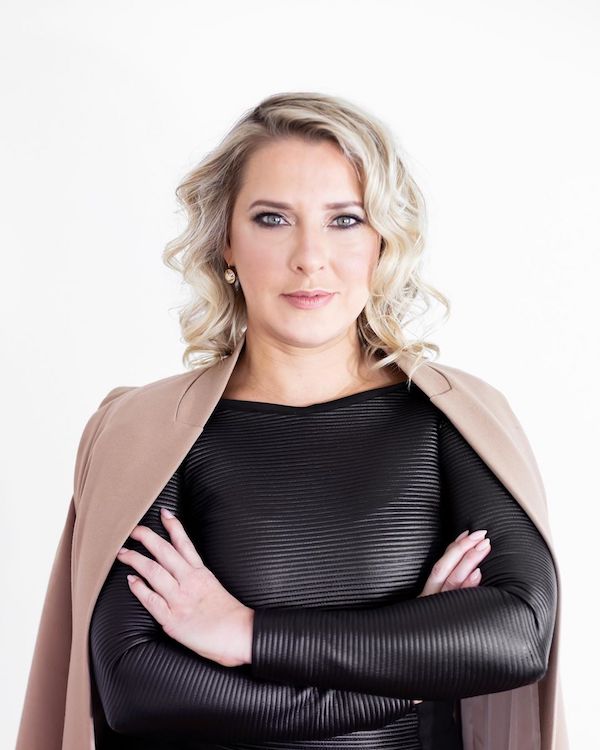
I think the first thing when you’re starting your business is figuring out are you going to operate your business as a sole proprietor? So, you’re just out there doing your thing or are you going to create a separate legal entity? And if you talk with an accountant, they’ll say, well, the tax benefits come into play after you’re starting to make six figures, blah, blah, blah. Absolutely true but you also want to think about it from a liability standpoint. So, if you’re out there running your business and you are a grown person that has some savings, you have a car, maybe you have a house, for example, like that’s something that when you’re hitting 30, most people have something.
The problem with operating under a sole proprietor is that your own personal assets become intertwined with the business because it’s you operating like yourself. So, if there’s any kind of liability or anyone wants to go after you, they can actually take your personal assets. Right. And that’s the issue, it takes a long time to save post-tax in this country. So the first thing is to figure out, does that work for you or in your personal situation, should you be operating as a company, a corporation, incorporating a company, because then it might be Raj Girn, but it’s actually whatever your company name is and you’re the director and officer of that business. So, now if there’s a liability issue, it’s really just the assets of the company. Your own personal assets are completely separate and that’s the foundation. Lay the foundation out.
Start under the business in the beginning so that if you want to bring on investors, if you want to bring on some equity, if you know that you’ve got an employee that you want to incentivize a little more with dividends, for example, structure your business so that you can grow. Now, some people will just do the sole proprietor, and that’s fine. We can eventually sort of, I call it upgrading, to be honest with you, an upgrade but there’s more things to do. You’ve got to sign over your contracts to the new company. You’ve got to open up your new business accounting with the banks, blah, blah, blah. So I’m more straight up than not. I tell entrepreneurs, look, if you want to have a hobby, go play. If you have the wherewithal or got gumption to really make this go, let’s roll this out and let’s build you four or five years, 10 years down the road.
WHY TRADEMARKING IS IMPORTANT. . .
Absolutely. So that brings me to another topic that a lot of people tend to shy away from until they get into trouble. And that is trademark. When is the time to trademark? Why do you need to trademark?
I mean, when you’re dealing with B2C businesses, business to consumer businesses, one of your biggest corporate assets is the brand and the foundation of the brand is your trademark. And the interesting thing about trademarks, I get very fired up about it because it ends up being a beacon that manipulates consumer behavior. Why would you buy an Adidas over Nike? It’s the construction of the actual product itself. It’s not that different. It’s what they stand for or the hype that they have around it. You know what I mean?
Before you go to market, you want to do your due diligence of is this a viable trademark or not? Because I have clients that they’re like, oh, I got the domain name that’s separate and apart from a trademark and so I’m good or the dot com was taken. But I got the dot ca. That could be a flag. You want to make sure that you’re moving forward with the brand that’s actually viable in the marketplace. And being in Canada, we’ve got a population of 30 million. So, you’re going to tap out of this economy pretty quick and if you want big money, you’ve got to go to the states. So, let’s just do the due diligence so that in five-year’s time, you have a North American brand rather than you busted and you’ve done well. And you’ve got to the point where you could afford to go to the trade show in New York. But oh you got your demand letter and you have to rebrand in the States. It’s no good.
So, you just bought another interesting point that I’d like to kind of highlight, and that is the whole ideology behind cross-border business. This is something else that your firm specializes in. Most businesses, if they’re not already online, there is an online strategy that is really encouraged today because it is what it is in terms of what we’re facing. Globally speaking, the economy is what it is. So, we have to kind of think about ways that we can pivot online, even if we are a brick and mortar business. Even if it’s as minimal as can I advertise to find my client online, to bring them to my physical space if I’m a hair salon or whatever. Let’s talk a little bit about some of that. So, cross-border is one thing, right? When you tap out and you’ve got to kind of think about offering your online enterprise globally. The other is, using online strategies to bring clients to your brick and mortar enterprise, so these are two separate entities, can you touch a little bit on both of them from a legal perspective? What do people need to know?
So, we manage global legal issues. I’ve got the ME in Dubai, the ME and India, the ME in London. We help our clients manage that. I think that it all depends. It’s contextual. Like if you have a services industry that you’re really focused on the Canadian market, you need to comply with the Canadian laws. And sometimes it’s not as simple and easy. So, the marketing, you’re going to have to comply with the different social media platforms policies, right? You’re going to have to comply with domestic advertising legislation, the Competition Act. And then there’s going to be Canada’s antispam legislation. Which is the digital email marketing that compliments.
You’re going to have to comply with the sort of competition, marketing and advertising campaigns as well. But then if you’re building out like let’s say, for example, you have a social media agency that’s working for you. You want to have the contract that deals with your B2B relationship. If you’re starting to go international, you want to make sure to have your website terms and policies and conditions set out very overtly as well, you need to comply with privacy law issues. Then if you’re starting to target other countries as well, know that it can become a bit more convoluted when you’re dealing with the online space. Generally, the rule is you want to try and meet the thresholds of laws that are the most stringent. So, GDPR in Europe has pretty stringent laws. California has pretty stringent laws and those are jurisdictions that mostly Canadians want to go to. So, it’s not a one size fits all situation. It’s contextual on, you know, what are you providing? Where’s your services? How are you using it? Who are you targeting? Where your audience, et cetera, et cetera.
So, do you recommend figuring that out before actually getting into that arena is a good idea, even if it’s just the minimal of having a conversation with a legal representative to make sure that your ducks are in a row before you hit that green button?
I think the traditional lawyer will say, absolutely, have your business plan, all of this. What I can tell you from the practical standpoint where we live in the practical world is that you can have your idea of your business it ebbs and flows. Who knows that your beanie would do super well in Salt Lake City, Utah, or whatever. I think that businesses for the most part have direction, but they also have a flexibility that can ebb and flow. So, if you’re rigid to your business plan and you thought you were going to get on board in five years, but hey, it’s Covid. You know, you’ve got to move it forward quick. And who knows in the end the marketplace, you can plan for it, but it doesn’t always happen exactly as you think, right?
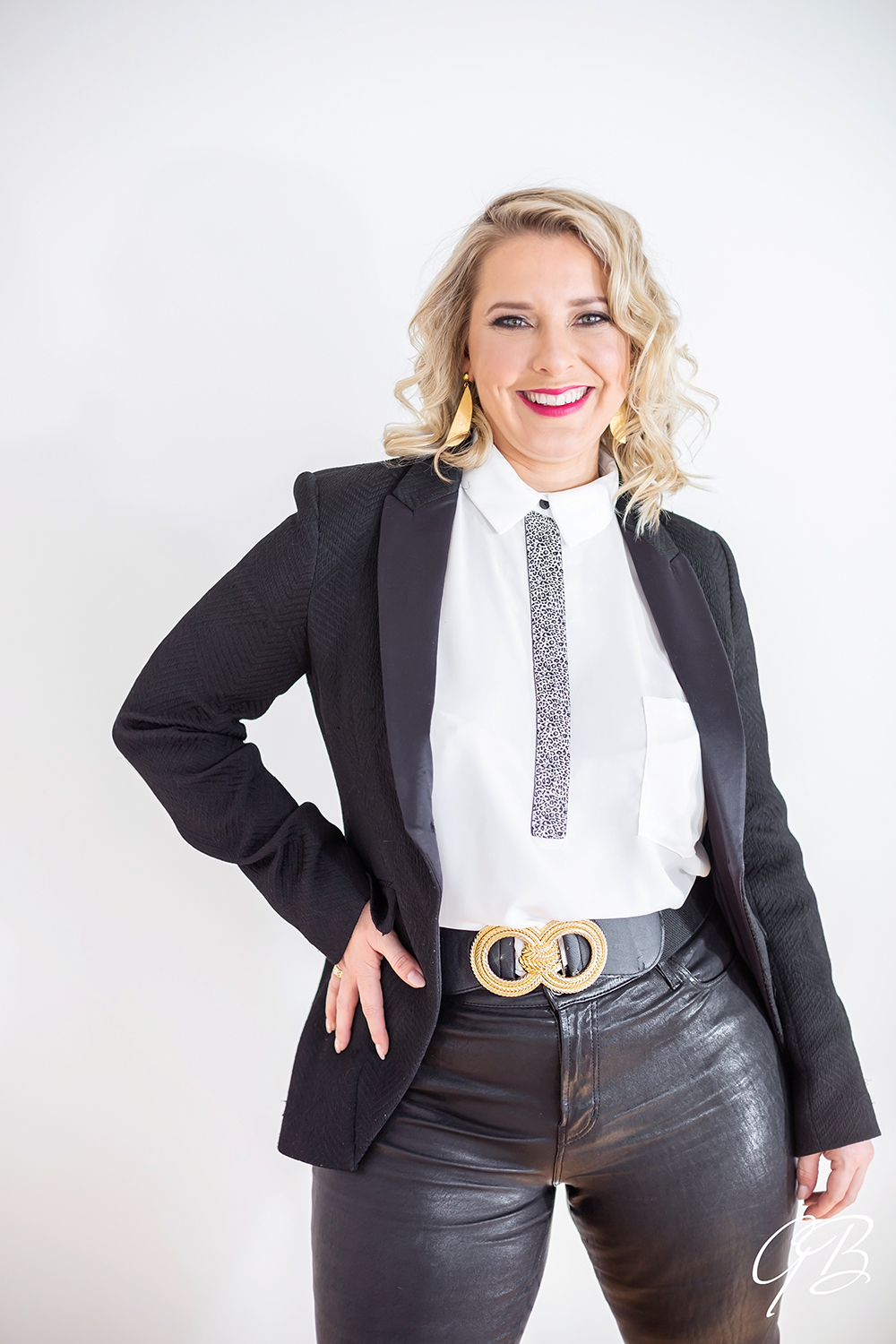
The law is a living, breathing thing as your business is a living, breathing thing because there’s a strategy. I think the biggest takeaway for clients to think about and business owners is that actually use the law as a tool to help your business. So, when you’re negotiating these contracts have the right robust terms and conditions in the business principles. But what about the force majeure? What if they don’t perform? What if they’re building an app for you and they don’t hit these milestones? You don’t have to pay them anymore. You can trigger termination. What if you’re licensing with the company and you’re partnering up and you don’t take in to advantage a change of control? And now they actually sold their business to your biggest competitor and now you’re bound by that? You don’t want to do that. So I think that there’s a misconception that you use a lawyer and the law when the shit hits the fan, but actually use it to your advantage to best protect yourself so that in the event that that happens, you’ve already got a leg up.
GUIDELINES FOR ONLINE BUSINESSES. . .
Right, So, with that said, Ashlee, you know, obviously we have to kind of identify how to make our way around the online space that includes social media. I know that your firm also specializes in that space as well. A lot of people online feel that they can do and say and be whatever they want, and they think that it’s the wild, wild west, but in fact, it isn’t. There are rules, regulations and guidelines that people have to submit to. Can we talk a little bit about that for anyone that is looking to start an online space page on social media and then also their own website for their wares and services? Can we can we get some headspace around that?
Yeah, absolutely. I think that you’re absolutely right. People have this misconception that it’s the wild, wild west and it’s lawless. It’s actually not. So, when these Twitter and Facebook and Instagram and TikTok, these are very, very recent iterations of how business is conducted and think about it. And domain names, for God sakes, like the Internet wasn’t around my whole life. Aging. I think what we have to realize is that in order for these platforms to flourish, they had to get buy in from the Nike’s. The Disney’s, the Louis Vuitton’s, all of these large companies that pre-existed the digital age. In order to do that, these platforms to some extent had to pander to having trademark dispute proceedings embedded within them, that if there’s a domain name, all of a sudden someone comes up with FroeseLawSucks.com.
There is actually a dispute resolution policy that I can attack the validity of that domain name and claim it back to me. So, it’s actually not at all lawless. There are a ton of laws that are applicable and global tribunal proceedings that are applicable to you as well. You want to make sure that you have your branding on point, because if you go online and there’s a competitor that already has it, they have a lot of different avenues to attack your brand, for example. You want to have your policies all set up. You are entering into a relationship with your clients that if they damage your bag and they want to return it to you, are you going to allow them to do that? No, but you have to have a policy, a contract basically in place.
And this is in place online on your website, very clear for anyone to access. Is this what you’re talking about?
That’s what I’m talking about. But it also, again, it depends on what it is like. I’m talking about just your straight online e-commerce kind of money exchange for a widget type of thing. But if you are now creating an online course and your subscription model and you know, and there’s a longer-term relationship or you’re creating an online rental of product for, you know, design or whatever. The baseline is that you want to have contractual agreements with your customers, with the service providers you’re using, and then you also want to have protection for the brand of how you are getting displayed to the world as well. So, it’s sort of three relationships that you have to govern, and you do that through various different methods of law, if that makes sense.
It does make sense. So, you know, all of what you’ve been talking about so far really begs an emphasis on people getting their legal footprint together. It really does. I know we talked about this already. When and where do you actually access expertise, legally speaking? And you’ve said that, you know, traditional law would say that you do it like on the onset before you start planning out your business. You say practicality isn’t the case and we have to sometimes even backtrack and kind of figure things out. But those people who are starting a new enterprise, what would you say to them? Like, one, two, three. What’s the order they should consider the legal side of things just because most of us want initiated in the legal field or scared shitless of it. And as you mentioned, also in our conversation, we go to you when we’re in trouble as opposed to the other way around.
Sort of you’re coming out of your basement and you’ve got an idea and you want to rock it out. A corporation non-disclosure agreement, independent contractor agreement. That’s a bundle that we can put together for you and it sets a foundation. What do these do? The incorporation protects you and your assets from personal liability. The non-disclosure is you’ve got your business plan. You want to pitch it to this person, pitch it to that person. I’ve got this idea; do you want to be an investor? Do you want to be a partner? The nondisclosure agreement will protect yourself and your idea and will claim that it is proprietary to you. And there’s a contractual obligation that it will be like, oh, that is a good idea, not interested in yours. And they do it themselves. The independent contractor agreement. You can’t do everything.
So you’re going to have a web developer, you’re going to have a photographer, you’re going to have a social media strategist, whoever you want to make sure that what they’re creating for you is owned by you, they waive their rights to it, that they’re going to do this deliverable by this date, that they’re not an employee. They have to pay taxes on top of what you’re doing. They’re not going to be getting CCP payments from you. That’s the foundation, because it takes a village to build a business. And you might not have employees, but you’re going to have certainly other people that are contributing, get that all locked up and make sure that those people are going to be attached to your business. So, again, you’re avoiding that personal liability. And if they don’t perform, you have a contractual breach of contract. I’m going after you because of this. It’s a lot easier to do that rather than the he said she said.
Yeah, that’s very interesting. You said this already in our conversation as well, is the way to look at this is what is the worst thing that could happen and am I protected for it? So, you mentioned that kind of earlier on. And oftentimes we don’t think about that as an entrepreneur. We don’t understand that there actually is a very, very important relationship that needs to be had between us and our business and our rights and the rights of others that we work with that have to be in place in order for us to ensure that mutually on both sides, everybody’s actually doing what they’re supposed to be doing within the confines of what it is, in fact, agreed upon that they’re doing, right?
Wouldn’t it be lovely if everyone did actually do what they were going to say at the level that they were on a timely basis within the budget, that they said that’s not the case and it may not be. But people are fickle like they really are, and people can be very selfish. This addresses when you have these contracts and the IDA, NDA and incorporation, that’s just the bare minimum foundation, like if you’re starting to get into a manufacturing agreement, right? What happened with there’s a product warranty. What happens if there’s a recall? What happens if you have to fulfill an order that you have with a wholesale and they’re not delivering it on time? In all of these different, you want to start to customize that or you start to get an influencer on what you’ve got to make sure that there’s a contractual obligation, that the influence is not to be wearing your t shirt while she’s snorting cocaine. I mean, like there’s a morality thing. Because you’re basing your company’s sales on the persona of this person, is it in line with what you want? Common sense is not that common.
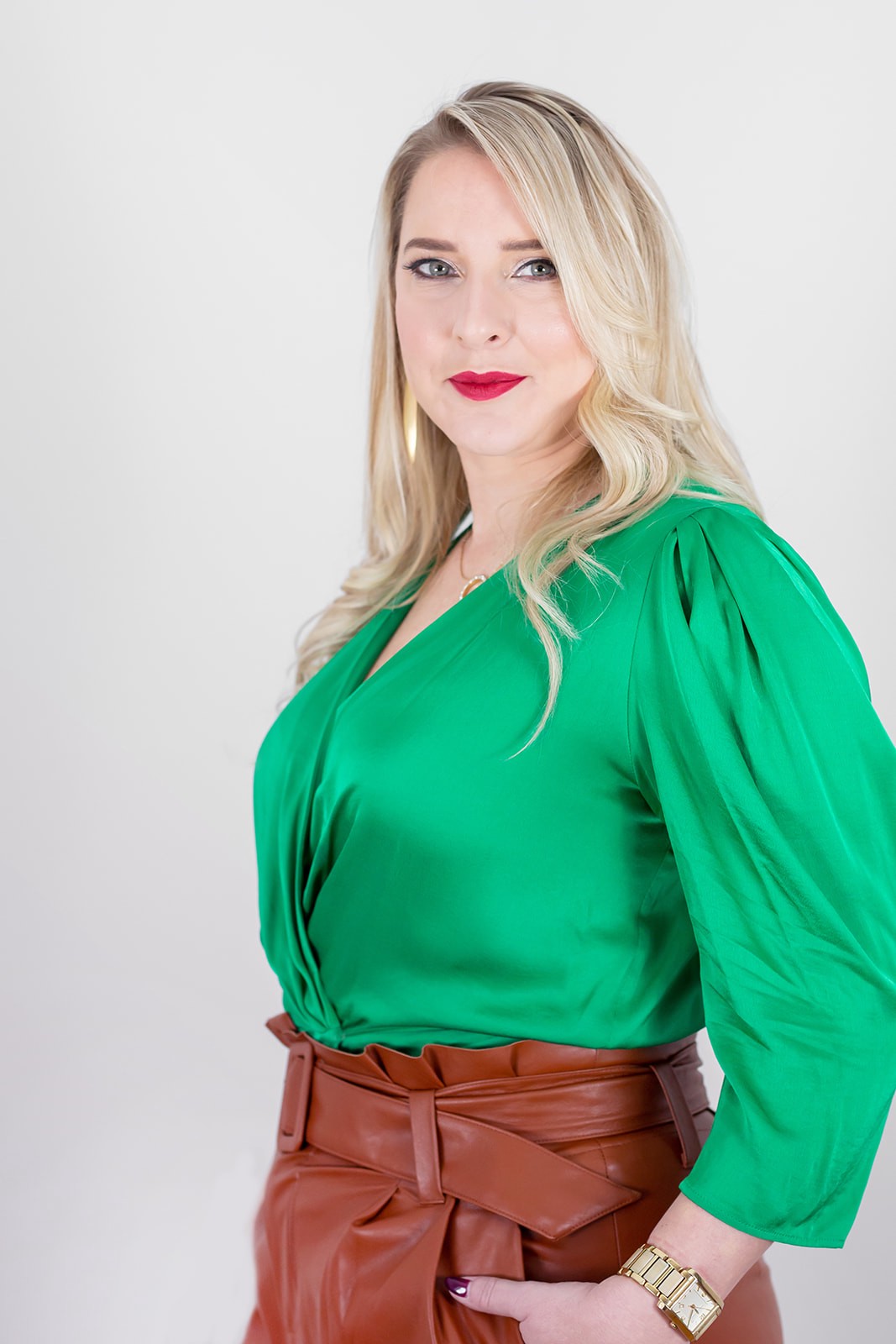
WHAT IS BRANDING. . .
Absolutely. I want to ask you a question, because everybody throws this word around. We kind of alluded to it towards the beginning of our conversation. The word branding. A lot of them have a very misguided understanding of what that would actually means in terms of how it relates to what they’re doing from a professional standpoint. Can you kind of give the legal description that you would need people to understand that meaning? Because there’s the pop cultural idea of what branding is, there’s the marketing, but the one that people really need to understand because it’s the one that can get you in trouble is the one associated with the boundaries that are legal related.
So branding is really a business construct. It’s a halo effect that enables you to manipulate purchasing behaviour and manipulate consumer behaviour, right? It’s kind of hard to contextualize. So it’s the je nais se quoi factor but don’t get it twisted it’s actually a very, very significant corporate assets for B2C businesses. It is comprised of trademarks, copyright, marketing and advertising law, packaging and labeling. Is it made in Canada or is it a product of Canada? If you have cosmetics coming out and you include this ingredient. Well, now that’s going to be defined by Health Canada as a pharmaceutical product as opposed to just a cosmetic product.
If you are starting to do advertising campaigns that go with your just sticking with skin care, for example, that it moisturizes, that’s one thing. But if you’re saying that it’s actually changing the constitution of your skin and that it is increasing elasticity or whatever it is, that would be another kind of product claim that would be governed by Health Canada separately. If you are starting to do digital marketing campaigns to promote this Facebook live for example, you have to comply with Canada’s anti-spam legislation. If you have a brand ambassador that is out there trying to promote the product that you’re doing, you should have a contract that’s defined between the two of you. But also know that the Competition Bureau is now cracking down on influencer marketing. And you’ve got to make sure that it is compliant with ad standards of Canada.
So this wild, Wild West folks that we think is out there in the world of social media is not the case at all. You heard it right here from my dear friend Ashlee Froese. She is the founder of Froese Law here in Toronto. For anyone that is joining us on the tail end of our conversation, the gist of our conversation is to understand your relationship with what’s happening out there from a legal standpoint that allows you to actually get more freedom with that knowledge to be able to do business. Am I correct?
It’s empowering yourself to use the law to your advantage. That’s what you want to do.
Absolutely. So, you know, I wanted to also ask because we didn’t get a chance to kind of explore this further. A lot of businesses are local businesses, they are smaller in their scope and they are brick and mortar. They are trying to figure out how to deliver their products, their wares to clients, as well as to bring clients into their space, especially now with Covid continuing along the journey of really creating a lot of disruption in businesses and the economy on a whole. What legally do you feel they need to know?
It’s the same kind of thing you want to have the contract between yourself and the customers, right? This is our return policy. This is what we’re going to do with your information so that you are compliant with the laws that govern consumer behaviour. It kind of depends how are you sort of creating this this online platform? Are you building your own e-commerce platform or are you using third party consumer platform that’s something you need to figure out. And what is the terms that they’re going to allow you to do that? If you’re building your own app, for example, you’ve got to have really strong provisions with your app developer as well. Are they expecting you to own it or are they expecting you to get the data of it? So, again, it depends, but a lot of it is going to be compliant with the marketing laws and then also protecting your ass through contracts with the various third parties.
WHAT HER FIRM FOCUSES ON. . .
So let’s talk a little bit just to kind of round things off for people out there in terms of all the various breadth of expertise that your firm is able to help people with. Let’s kind of hone in a little bit back on that. We have kind of broken down a lot of the areas that you work on and why those things are important for business owners. Can we regroup a little bit for anyone that’s kind of joining us at this part of the conversation, on some of the areas that your firm focuses on, just so that we can be very clear on that?
Absolutely. We do corporate contracts, trademarks, copyright, domain names, social media, marketing and advertising, packaging and labeling, licensing, Internet and technology law. So really a one stop shop for businesses. And we also have a US lawyer that’s on staff as well. So, as our clients are going into Canada, we can do your US legal work, Canadian rates, Canadian currency, which you know that gives a significant savings as opposed to being charged in the US currency. And then something else that we’ve also been doing, it’s more of a soft launch, is that we’re actually sourcing out government grants that are available for clients as well. Outside of what’s available to Covid so that’s the value-add.
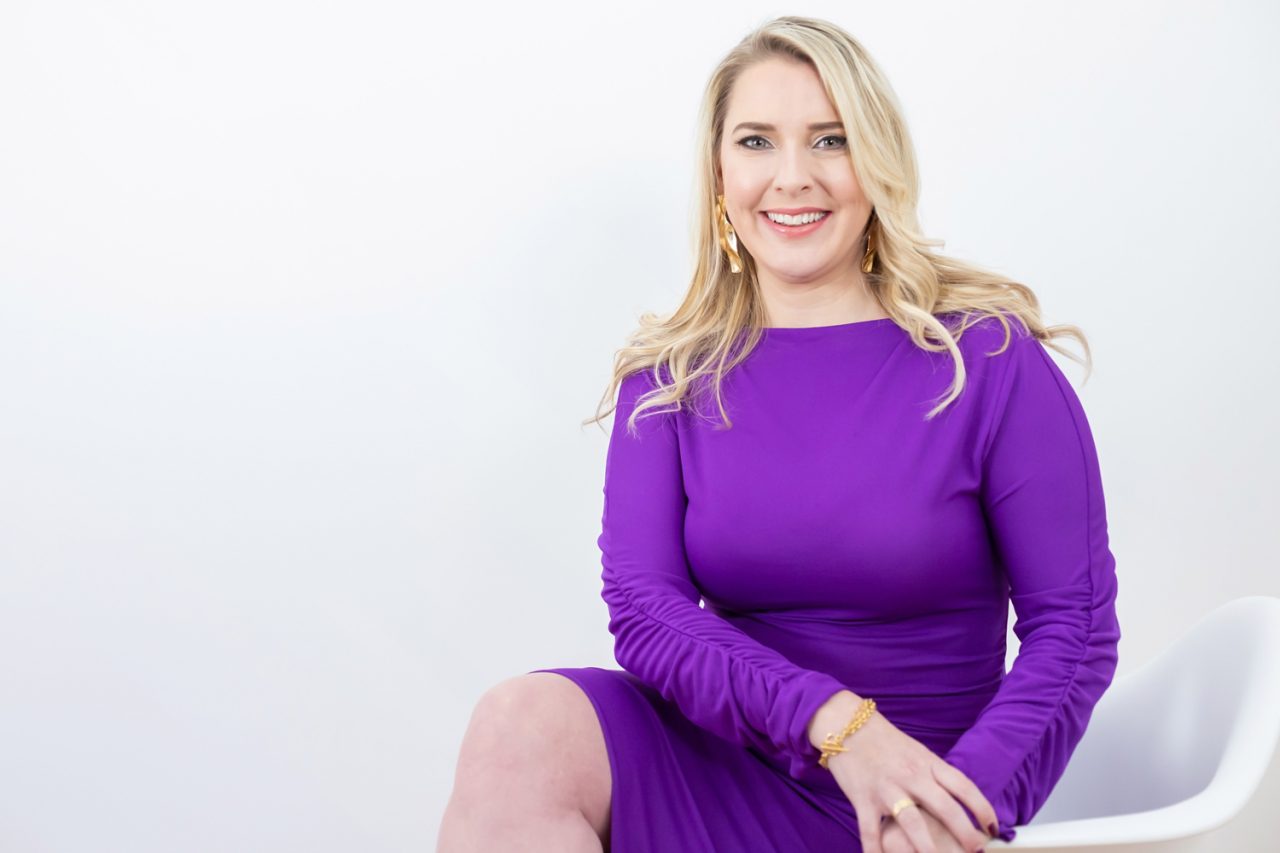
How would people tap into that with your firm?
So basically, what we’ve been doing is one of those things that I always wanted to put together. So, during Covid, I actually employed a couple of people to just scour all of the federal and provincial websites of the different agencies. What’s available in what industry, how much, what’s the process, et cetera, et cetera. We’ve got a list of about seven hundred grants that are available, and it depends on what industry you’re in. We work with you to figure out what’s your business plan now and what could it be? Because you might want to shift it so that you can have access to this or that. And then we work with you of this is the information we need. This is how we need to compile it, et cetera, et cetera.
Folks, I do want to mention something which I haven’t mentioned yet. I wanted to kind of wait until the end of our conversation. But, you know, a lot of people always ask me because as an entrepreneur, I’m very kind of brand centric. And it’s important to me to ensure that the validity and the authenticity of what I put out there specific to any of the brands that I own is very, very clear. Also, the relationships that my brands have with other brands that utilize us in order to accomplish ABC, X, Y, Z. The lawyer I use to help me do that is Ashlee. She has been on my team for the last 10 years.
I’m going to just put it out there to you guys because for want of full transparency and clarity on why I felt that having this conversation with Ashlee for all of you guys was important is because I’ve actually experienced her long term across my quite tumultuous journey as we have as entrepreneurs, as the space keeps changing, as demands from our consumers and clients keep changing, and our need to make sure that we are, in fact, entering into relationships that are mutually viable and respectful of the exchange that we’re looking to accomplish. I’ve been on quite the journey, as Ashlee knows, I’m into my third brand that will be launching soon, which I will be talking to you guys about that she’s also helping me with. On a personal note, I just want to mention to you guys that working with a lawyer that doesn’t scare the shit out of you who can actually talk to you in plain English as opposed to all of the academic language that a lot of lawyers kind of throw at you and scare you into thinking that you need to do something just because of the fact that they’re speaking a dialect that you don’t understand. You don’t get that at Froese Law.
I am putting it out there, Ashlee. I know that you probably can be like, oh, my God, Raj, but I need to do this because I feel especially like every other day, they’ll be someone or the other DMing me because they’re in some sort of a situation. And it always comes down to the same common denominator. And that is the fact that they don’t actually understand the rights within their business. It really does come down to that. And I felt that this conversation that I’m bringing to you guys is a really important one to have, especially this year as we further our journey into looking at ways and opportunities that we can actually increase our footprint in our businesses in the online space. So, Ashlee, it’s just been such a pleasure chatting with you. I want to talk to you about so much more. But I think that we’re going to have to bring you back on to maybe focus on certain specific areas, because this has been more of a kind of one or one that we’ve taken people on. How can people contact you before I let you go?
Okay, absolutely. So, you can go to FroeseLaw.com and subscribe to our newsletters. You know, if you’re not ready to talk to a lawyer now, that’s completely fine. At least be a part of our community and start to educate yourself. And that’s the first thing you can do.
Absolutely. And signing up for your newsletter is obviously on FroeseLaw.com. Just go check out the kind of things that her corporate culture talks about, what they’re kind of their wheelhouse is if you want to have a more in-depth understanding of what they do. But the great thing I love about this particular law firm, other than all the things I’ve already mentioned, is the fact that they are very, very information and educational centric. So, subscribe to the newsletter and get that knowledge. It’s a lot more than you’re actually getting and doing right now. So thank you so much, my darling. Ashlee, such a pleasure. You are just a wealth of wisdom. And I always love sharing space like this with you very, very informed, necessary and important conversation that everybody needs to hear today in today’s economic climate. Thank you so much, my darling. And I look forward to the next time we chat.
Thank you so much, Raj.
